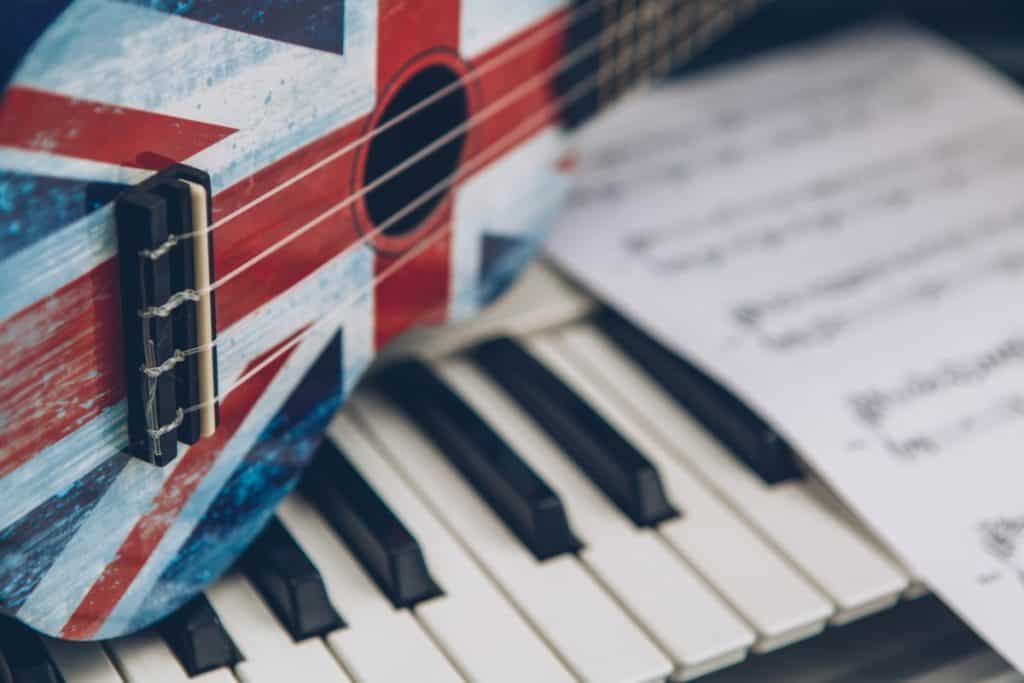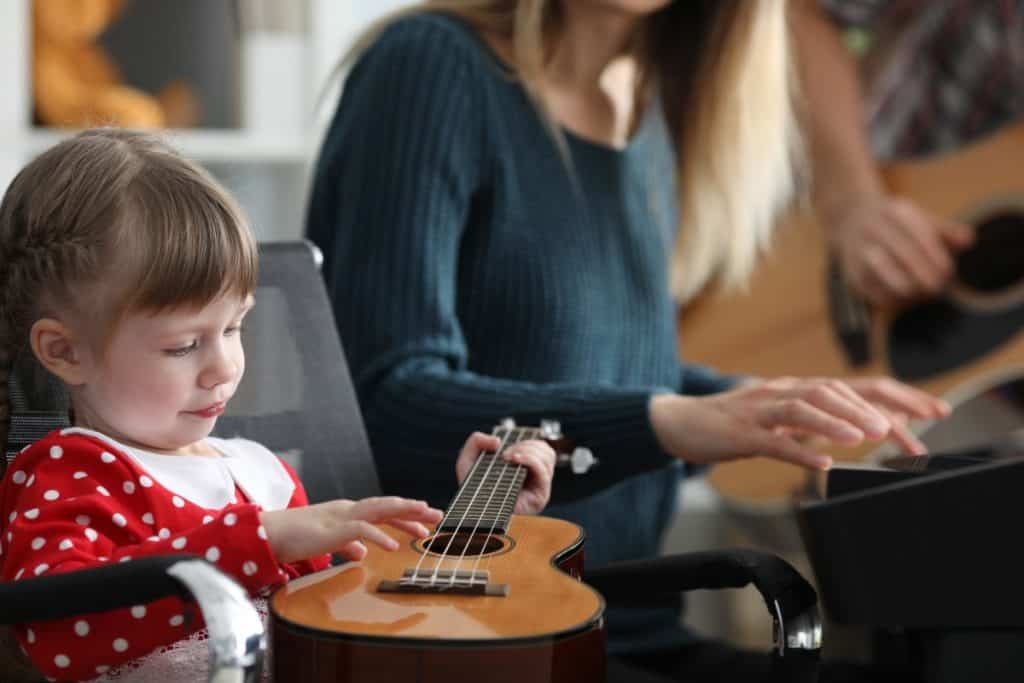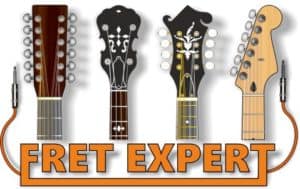Trying to compare a ukulele with a piano is the question is somewhat akin to “what’s your favourite colour”!
It’s what appeals to you most and how applicable either instrument is to your circumstances.
Nevertheless, people do ask me which is best between a ukulele and a piano – either as a first instrument, for something your child could learn, for chord difficulty, or just to see which is “easier”.
As someone who loves to play both, I’ve broken down a full comparison and common questions below.
Covered in this Article:
Should I learn Ukulele or Piano?
Although they are very different, you might be weighing up the difference between the ukulele and piano because they both have the advantage of belonging to a diverse set of musical instruments referred to as chordophones.
This select group produce their sound through string vibration, so a keyboard instrument such as the organ doesn’t qualify, because it uses electronics or bellows.
They are also capable of playing more than one note at a time – thus the term chordophone or chord-voice.
Arguably, that’s where the similarities end. The differences that will probably be important to most new players are broken down below:
Ukulele v Piano: Cost
Before you decide on any instrument, you should check its affordibility.
This doesn’t just mean buying the instrument itself, but also the accessories that usually come with it, or that it eventually needs (e.g. ukulele strings, or a piano tuner).
As far as cost goes, the ukulele wins as it’s relatively cheap at entry level. Strings aren’t expensive, and neither are optional additions like a case.
Even an entry-level piano however, generally carries a hefty price tag. Even if you got one second hand (by that I mean cheap, or even free), you’ll need a professional piano mover to shift it.
This can cost anywhere from $100-250 locally or run into four figures if it’s cross country. In the UK, prices are similar; around £100-175. Then it needs tuning upon arrival. That’s much more than the cost of a decent ukulele!

Ukulele v Piano: Space and Portability
It may sound obvious but even the smallest pianos occupy a big footprint in a room, and can be very heavy to move from place to place.
You may not think you’ll move it, but life gets in the way and owning a piano can add hundreds to the cost of an average house move.
With the advent of digital pianos, the portability aspect of owning one and transporting it has become a lot more practical, but it still isn’t an item you can carry onto an airplane or bring along to a picnic.
So if your tick list includes price and convenience, the ukulele is, again, likely to be the better option.
Ukulele vs Piano: Versatility
Putting aside the issues of price, size and portability, it’s more interesting to engage in a discussion of the musical qualities both instruments bring to the table.
Versatility-wise, the piano has attributes the ukulele can only dream of possessing.
In theory you can play ten different notes at a time, whereas the uke limits you to a maximum of four.
Harmonically, the piano’s range is greater than any other chordophone, with its standard 88 notes in seven octaves, in comparison to the ukulele’s two and a half octaves on the slightly larger tenor models.
Although it’s a thankless task to try to pigeonhole any instrument into any particular genre of music, the piano is a lot more suited to the classical repertoire than the ukulele, although skilled players have been known to dabble in music associated with the lute and guitar.
The piano very much lives up to its original name, pianoforte, meaning quiet-loud.
The nuances in between the very loud and the fairly quiet make the piano unique among its fellow keyboard instruments, with the harpsichord and the organ possessing little variation in their dynamics according to how gently or vigorously a key is depressed.
The uke may not possess the dynamic extremes of the piano, but it is capable of degrees of subtlety according to how hard you strum or pluck the strings.
The manner in which the strings are struck also has a large bearing on the volume it produces.
Using a strumming style with the pads of the thumb and index finger in an Hawaiian style will produce a soft lilting effect, whereas employing the tips of your fingernails or a plastic pick or plectrum, will give the instrument much more of a cutting edge.
Strumming is also an effect the piano can never produce and adds a certain rhythmical, happy quality to any song.
Is Ukulele Easier to Play Than Piano?
I know you’ll want a short answer, but to define the word ‘easy’ is in itself not easily definable when comparing the uke and piano.
Acquiring the ability to learn a song to a standard good enough to play in front of your nearest and dearest or Mr. Brown from next door, is probably a lot easier on the ukulele, where a simple three chord song will be more than acceptable.
So if speed is your consideration, you can get to ‘playing a simple song’ level on the ukulele faster than you probably can on the piano.
Producing a similar level of performance on the piano, aside from the hunt and peck style of single note playing, will take a lot more application and the likely assistance of a qualified teacher.
On the other hand, chord playing requires less two-handed technique and can be very effective within a popular music accompaniment context, but probably rules out any pretensions you may harbour to reproducing the Shubert, Chopin or Beethoven piano repertoire.
If your playing is likely to be supplemented by singing, then both instruments fulfill the accompaniment role very well, something woodwind or brass players are incapable of for obvious reasons.
If, on the other hand, you want to play tunes without a vocal element, then the piano is a lot more likely to produce results at a lower level of technique.
The skill set required to play recognisable unaccompanied tunes on a ukulele, requires a much higher standard of musicianship, something along the lines of a virtuoso like Jake Shimbukuro, James Hill or Tiamane Gardner.
So in summing this one up, the term ‘easy’ is comparative and largely depends on which direction you wish your music to progress to.
Which is Easier on the Body?
Here’s something very few people consider when deciding between a ukulele and a piano.
As far as wear and tear on the fingers goes, the piano is likely to be a little gentler in comparison to any stringed instrument, albeit one with nylon or composite strings as used on most ukuleles.
You aren’t going to develop calluses by banging on a collection of wooden or plastic keys, but you will overtime do so with any stringed instrument, regardless of the string type (nylon or steel).
So in this respect, your practice time is likely to be greater on a piano, but it won’t be as suitable for you if you have other issues such as with posture and backache.

Which is Best for Kids: Ukulele or Piano?
Leading on from the above, much the same advice applies, except it’s important to take hand size into consideration.
For younger children, the ukulele is probably the better option when it comes to chord playing, because of their limited finger/hand span.
A soprano ukulele is perfect for small hands and results can be attained quite quickly.
They are also likely to stick at something which will bring quick results and from there, grow to greater levels of difficulty.
That’s not say the piano isn’t suitable for children, but again some structured lessons will probably be needed to get beyond the initial fun of banging out a few random notes.
Also, a ukulele, as has been mentioned earlier, is less of an investment than a piano if your child decides it’s not for them. It’s also less likely to annoy neighbors if you have thin walls!
This is less of a problem if you have a digital piano, because headphones can be used.
There are many beginner’s guides to playing both instruments online, particularly on YouTube, so this is another way of off-setting costs if money is tight.
Conclusion
The diplomat in me favours learning both instruments, but for a beginner, it’s probably sensible to start with one before adding the other to your repertoire.
The ukulele is cheaper, more portable, is easier to learn the basics on and better for younger players.
The piano has superior versatility, but is more expensive and will take more practise – with results that are often worth it.
Can’t decide? Well, you could always try both!
Happily, a uke and piano combine well, should you and a companion settle on forming a musical duo incorporating the strengths of both.
My best advice is to trust your intuition. You may think one or the other is your favourite, but you won’t know until you try.
Go to your music store and have a go at both if they’re available. You don’t have to be a genius at either one to make a reasonable noise and get a feel of how you respond to each one.
As a player of both to dubious standards of musicianship, I can’t really say which instrument is better. Both have their advantages and limitations and both are capable of great musicality in their own way.
You can never learn too many chords and the more you learn, the more material will be available to you.
